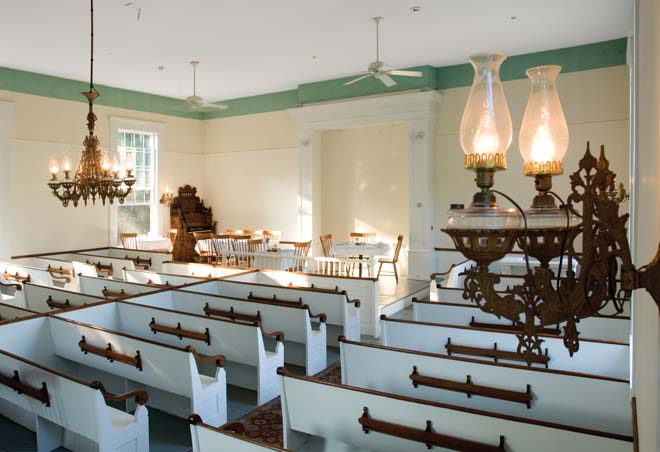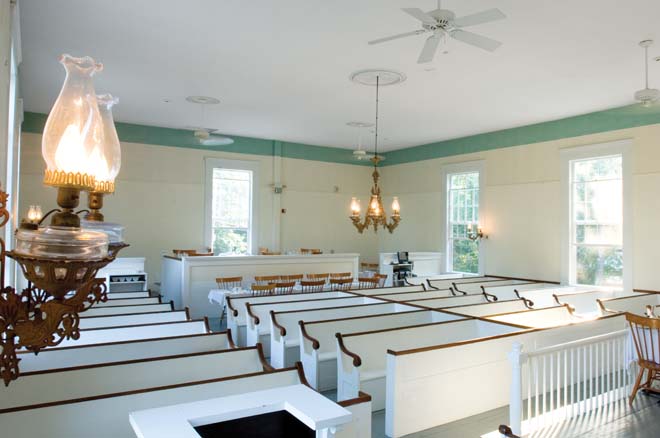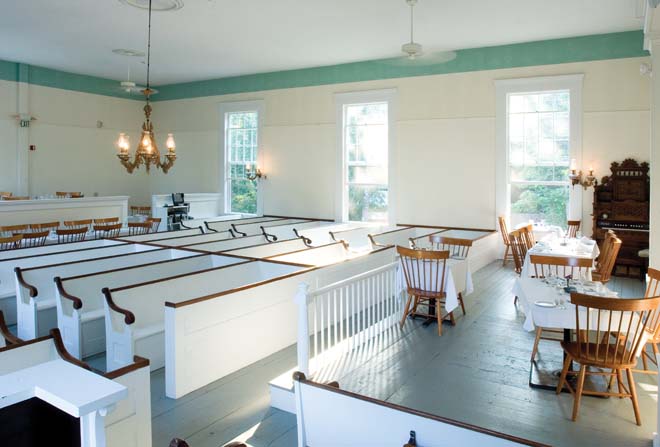Recipe for Success
FEAST-October 2009 (from Maine Home+Design)
By Rebecca Falzano
Photographs by François Gagné
When chef Michael Gagné, co-owner of Robinhood Free Meetinghouse in Georgetown, set out to create the perfect biscuit years ago, little did he know that his personal passion would become an obsession, and that his obsession would become an all-engulfing business pursuit. The Biddeford-born Gagné is a tell-it-to-you-straight kind of guy, and listening to him talk about the biscuit business with undisguised enthusiasm is an entrepreneurial inspiration.
Gagné’s love of the biscuit began long before he helped transform an 1855 Methodist church in Georgetown into Robinhood Free Meetinghouse. It began thirty years ago in Virginia, “biscuit country” as he calls it. While working at the Red Fox Inn, Gagné sought an alternative to the heavy, lard-based biscuits so popular in the South. He began toying with different recipes, eventually diverging from the traditional beaten and dropped biscuit to create a fluffier cream cheese and butter biscuit inspired by puff pastries. “It was as if a biscuit met a croissant in a dark alley and made a love child,” he jokes.
Several years later, armed with his formula for the perfect biscuit, he moved back to Maine, where he had family ties, and began working at the Osprey in Georgetown. It was there that he met colleague Troy Mains, who would later become chef de cuisine at the Meetinghouse. Eight years later, when his contract was up with the Osprey, Gagné decided to help transform the Methodist church down the road into a restaurant and catering facility. Along with the building’s owners, Pat Burns and Elizabeth Spaulding, Gagné took on the task of renovating the historic post-and-beam, Greek Revival structure that had been used alternately as a community meetinghouse, a high school, and a library throughout the years. “I just fell in love with the building,” says Gagné.
After a careful restoration (“We went to great pains to assure the authenticity of the renovation,” Gagné says), Robinhood Free Meetinghouse opened for business. And, of course, the biscuit making continued—that is, until one day, by accident, an idea was born. “Someone inadvertently stuck the biscuits in the freezer instead of the refrigerator. We needed them right away, so we wound up baking them frozen. And they came out really well,” explains Gagné. The discovery now meant that the biscuits could be made in bulk and sold directly to customers who would cook them at home. The first baker’s dozen Gagné sold left the restaurant wrapped in butcher paper. But as local interest grew, the Meetinghouse staff developed packaging and gained regional distribution, and before long everyone was working overtime on the biscuit business. “During the day, we turned the dining room into a war room; we had nine people at five desks,” says Gagné. Then, in 2006, Gagné purchased a production facility in nearby Bath to meet growing demand. The biscuit blossom had officially bloomed. With limited resources but an inventive team, Gagné and his staff developed an all-natural way to reformulate the leavening system to increase shelf life while retaining quality. This method sometimes involved rerigging machines to work more efficiently. “We figured out a way to process at what I think are amazing speeds using seven natural ingredients. Having very little money but lots of smarts is a great combination,” he says.
As orders grew from cases to pallets, Gagné spent more and more time at the factory running the new operation while Mains took over the Meetinghouse kitchen. Mains, whose resume includes stints at Bath’s Beale Street Barbeque and Restaurant August in New Orleans, crafts a contemporary cuisine based on traditional and seasonal New England ingredients. The two chefs still collaborate extensively on the menu, often merging their distinct personal styles into one dish. Entrees like crispy-skin duck breast with butternut squash, citrus-mint côtelettes of lamb, and lobster hash feature locally grown ingredients—something the Meetinghouse has prioritized since its inception. “The shorter the distance between the farm and the plate, the better the quality,” says Gagné. To mix it up once a week, Mains puts on a theme night that highlights regional dishes ranging from Italian and German to Cajun and Caribbean to Thai and Szechuan. And, of course, there are the biscuits—a Meetinghouse must-have.
As memorable as the cuisine is, so too is the ambience inside the historic meetinghouse. Many of the original features remain intact, including the oil lamps, the upstairs pews, and the books that line the sitting room. It is easy to imagine the building’s former days; the remains of the old school desks are still visible in the dining room floor, and in the restroom a chalkboard is frozen in time with notes from the last catechism class that was taught there in the 1950s.
As diners enjoy an exquisite culinary experience in the historic Meetinghouse, several miles down the road the family-run Gagné Foods, Inc., is churning out 16,000 pounds of biscuits a day. The business has come a long way since its humble beginnings in the Meetinghouse kitchen, and its growing list of national retailers includes major chains such as Hannaford Brothers, Costco, and Whole Foods. Gagné has even expanded the original Gagné Foods line to include six products, and in 2006 his biscuits took home the National Association for the Specialty Food Trade’s award for Outstanding Baked Good.
“It became all-encompassing,” says Gagné, who is satisfied to have found the perfect biscuit recipe: flour, milk, butter, cream cheese, baking powder, sugar, salt—and, of course, a lot of heart and soul.







































